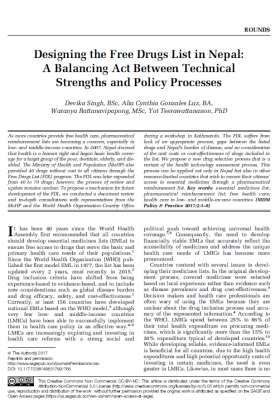This website uses cookies so that we can provide you with the best user experience possible. Cookie information is stored in your browser and performs functions such as recognising you when you return to our website and helping our team to understand which sections of the website you find most interesting and useful.
Designing the Free Drugs List in Nepal- A Balancing Act Between Technical Strengths and Policy Processes

Details
As more countries provide free health care, pharmaceutical reimbursement lists are becoming a concern, especially in low- and middle-income countries. In 2007, Nepal decreed that health is a human right and began basic health coverage for a target group of the poor, destitute, elderly, and disabled. The Ministry of Health and Population (MoHP) also provided 40 drugs without cost to all citizens through the Free Drugs List (FDL) program. The FDL was later expanded from 40 to 70 drugs; however, the process of review and update remains unclear. To propose a mechanism for future development of the FDL, we conducted a document review and in-depth consultations with representatives from the MoHP and the World Health Organization Country Office during a workshop in Kathmandu. The FDL suffers from lack of an appropriate process, gaps between the listed drugs and Nepal’s burden of disease, and no consideration of the unit costs or cost-effectiveness of drugs included in the list. We propose a new drug selection process that is a variant of the health technology assessment process. This process can be applied not only in Nepal but also in other resource-limited countries that wish to ensure their citizens’ access to essential medicines through a pharmaceutical reimbursement list.
Full Text: http://journals.sagepub.com/doi/full/10.1177/2381468317691766




